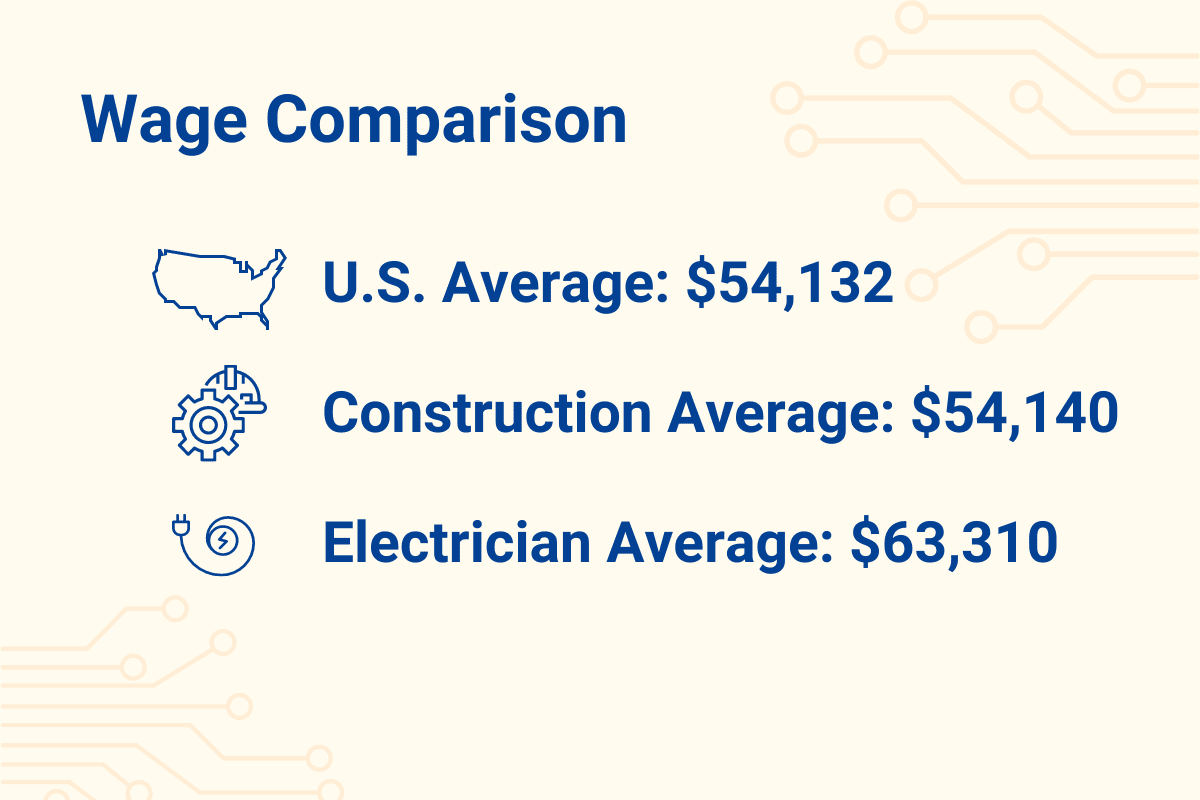Do Electricians Make Good Money? Salary & Profit Potential
Average earnings for employees and electrical business owners
By Jake Perry | Updated March 9, 2023
Electricians are among the most in-demand professions in the United States. The Bureau of Labor Statistics estimates that there will be 50,200 new job openings for electricians by 2031 (1).
Do electricians make good money? Electricians earn an average annual salary of $63,310, which is 15% above the construction industry average. Electricians can also take on short-term projects or contract work to make more money. In addition, electricians enjoy greater flexibility in their work schedules and location.
Of course, an electrical contractor salary depends on many factors, including experience, education, and geographic location. But what about the different types of electricians?
In this article, we will dive deeper into the different areas of work electricians can be employed to understand how much electricians make.
National Wage Averages

Next, it’s worth noting the national average wages in the US. If you don’t have anything to compare with, it’s hard to understand if electricians do, in fact, make a good wage.
We will use the median average wages here as this is a better overall indication as it removes any outliers from people earning millions each year or earning hardly anything.
The US Bureau of Labor Statistics reports that the median wage in the US is $54,132 per year (assuming 52 weeks of work per year). That can be broken down into a weekly income of $1,041 (2).
For the construction industry as a whole – which includes electricians – the US Bureau of Labor Statistics reports the annual wages to be $54,140.
But how do these numbers stack up against electricians?
Average Electrician Wages
The most important factor is experience, as more experienced electricians can charge higher rates and do more complicated work.
Electricians with years of experience can make upwards of $100 per hour, while those just starting may make around $20-$30 per hour.
Overall throughout the US, electricians earn on average $63,310 per year. This means they have a higher average, nearly 15%.
Regarding geographic location, electricians in some parts of the country make significantly more than the national average. For example, intermediate-level electricians in Alaska have an average salary of $66,700, while those in Arkansas have an average of just $53,800.
Again, the experience level significantly differs in how much a person earns. For example, employees in Hawaii just starting will earn an average of $50,400, but a master electrician with 7+ years of experience will be earning nearly $100,000 per year.
These are just the surface figures, and there are a few other factors to consider. There is the type of electrician you are or plan to be. Do you work as a one-man electrical shop, or are you a business owner looking to grow a team of electricians?
Or perhaps you are happy to work for a company. Here’s a breakdown of each below.
Working For a Company or As a Contractor
This is where you find out how much electrical contractors make and how much you can make working for a company as an employee or journeyman.
Benefits do come into play when working for a company as an employee.
- You will have the security of knowing you will receive a wage every week, holidays, and sick days off, and in some cases, your employer will offer health insurance.
- You can also receive other benefits, such as a retirement plan or paid vacation days.
As an electrical contractor, you may benefit as you get paid by invoice rather than salary. Therefore electrical contractor profit margins could be much greater than being an employee on a salary.
Sole Traders – One Stop Shop
It gets a little different when you start to work on your own. When you work as a sole trader electrician, you don’t have the same job security as an employee.
When work is slow, there may be no work and no money coming in. This can be a stressful time for someone with bills to pay.
There are some benefits though to working for yourself. You will have full control over how much you earn, what work you do, and when you do it. You are your own boss!
There are other considerations to make if you choose to go down the route of working for yourself. These include:
- You will be responsible for finding your own work
- You may have to do your own marketing
- You will need to do your own accounting and tax returns
- You will be responsible for your own health insurance
Overall, working for yourself can be a great way to earn a good income as an electrician.
However, it is not without its challenges. There is for sure a greater amount of money to be made by working for yourself, but your time is only limited, and it isn’t the ‘easy’ option for sure.
Owning a Business
The final option is to start your own electrical business. This can be a great way to make a good income as an electrician while also having the security of knowing you have a team of employees working for you.
That means an electrical business owner’s salary could become over $100,000.00 per year.
Of course, some challenges come with owning your own business. These include:
- You will need to find and manage a team of electricians
- You will need to do your own marketing
- You will need to do your own accounting and tax returns
- You will be responsible for the health insurance of your employees
Having your own business as an electrician and employing multiple people allows you to leverage time and potentially make much more money.
However, there are a lot of difficult challenges in running a business; statistically, you are very likely to fail.
Pro-Tip: If you’re looking to start a business as an electrician, you can do it with a transitional phase to decrease risk. Start as a sole trader to build your client base and then start to bring on employees when you become too busy, shifting your sole trader model into a corporation model.
What Electricians Do
First of all, if you’re looking at a career as an electrician, it’s worth understanding exactly what they do on a daily basis.
- Electricians are responsible for the installation, maintenance, and repair of electrical systems. This can include everything from wiring homes and businesses to fixing streetlights.
- They often work in challenging or cramped spaces and need to be able to identify problems quickly and efficiently.
- Electricians must follow complex blueprints and diagrams to get the job done correctly.
- In some cases, electricians may also be responsible for training apprentices and teaching them the ropes of the trade.
Required Skills & Training
To become an electrician, you must have a few essential skills and some training.
- First, you will likely need a high school diploma or equivalent, although in some cases, you may be able to do an apprenticeship which requires only a GED.
- Next, you will take classes at trade or technical school related to electrical wiring and circuitry.
- In addition, during your apprenticeship, you will complete on-the-job training under the supervision of an experienced electrician.
- Once you have completed your training and apprenticeship, you must obtain a license from your state or local municipality. To do this, you will likely need to pass an exam testing your knowledge of electrical code and theory.
With the proper skills and training, you can begin your career as an electrician.
But the question remains, is all of this training needed to start earning roughly 15% more than the national average worth it?
It can be said that starting a job that does not require education and working your way up could pay off financially in the long run.
- First, you will not have any student debt or loans to repay.
- Secondly, you will have many additional years to climb the ladder and increase your salary, which would have been lost while training as an electrician.
These two issues are worth considering when thinking about becoming an electrician. But on the counter, with a specialized career path, job opportunities up the ladder appear more frequently, and the page percentage increased more than a standard job.
So with that in mind, starting a profession may be more fruitful. At the end of the day, it depends on your unique requirements and what you want out of your career.
Benefits of Becoming an Electrician
So you’ve realized you can make a good bit of money from becoming an electrician. But is it really for you?
- The skills required to be an electrician are relatively easy to learn. With the proper training and apprenticeship, most people should be able to complete the necessary requirements within just a few years.
- Electricians typically do not work in an office environment. This means they can enjoy greater flexibility in their work schedule and location.
- Electricians can take on short-term projects or contract work, leading to a higher income or some money on the side.
Final Thoughts
With the proper skills and training, you can expect to earn a salary above the national average.
There are many benefits to becoming an electrician, such as job flexibility, the ability to take on your own projects, and a choice of ways to work; contractor, sole trader, employee, or business owner. With the expected growth in the industry, finding a job should not be too difficult either.
Frequently Asked Questions
Are the high wages worth it?
You need to consider the cost of training and whether or not you are willing to take on debt to finance your education. You also need to consider how long it will take to complete your training and obtain a license and if this pay increase outweighs the time you could spend climbing the ladder in another occupation.
Is it Easy to Find a Job?
The job market for electricians is expected to grow by 7% from 2021 to 2031, which is faster than the average for all occupations. This growth is primarily due to increased construction activity and the need to replace aging electrical infrastructure.
Therefore, finding a job as an electrician should not be too difficult. However, it is worth noting that the competition for jobs may be higher in some areas than others.
References
- https://www.bls.gov/ooh/construction-and-extraction/electricians.htm
- https://www.bls.gov/oes/current/oes_nat.htm
Written by Jake Perry

Jake Perry is a writer from the United Kingdom. He travels the world while working from his laptop, learning about new business trends from startups around the world.